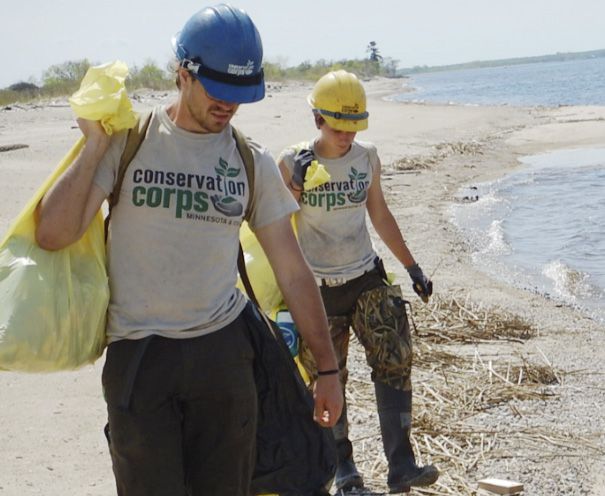 Minnesota Conservation Corps members clean up the southern shoreline along Lake of the Woods. Danny Gedig/MN Conservation CorpIce fishing, snow machining, hiking, skiing… these are all great outdoor lake-based activities we are so lucky to have on our doorstep. Inevitably, we will bring food and drinks and, with that… garbage. With the winter season upon us and holidays around the corner, I’d like to dedicate today’s column to discussing garbage and the importance of not leaving it on the ice.
Minnesota Conservation Corps members clean up the southern shoreline along Lake of the Woods. Danny Gedig/MN Conservation CorpIce fishing, snow machining, hiking, skiing… these are all great outdoor lake-based activities we are so lucky to have on our doorstep. Inevitably, we will bring food and drinks and, with that… garbage. With the winter season upon us and holidays around the corner, I’d like to dedicate today’s column to discussing garbage and the importance of not leaving it on the ice.
Every winter, thousands of people head out onto our lakes for ice fishing tournaments, family fishing days, snow machining on the ice road, winter construction projects, accessing cabins by car/truck and skiing or walking trails. Some days, it looks like another city has sprung up on the ice and it can make for an excellent winter experience. With this comes ice huts, campfires and temporary “campsites”.
The amount of garbage that is potentially generated in a single day, especially on a weekend, could be immense and we all need to remember that the lake’s ice surface is no place for garbage to be left, only to land in the lake when the ice melts in the spring. Just like the mantra for backwoods camping, it’s important to remember “pack it in, pack it out”. It’s not a case of out of sight, out of mind… the health of our lakes depends on us being vigilant about ensuring we keep items that don’t belong in the lake, out of the lake. Plastics, cans, food items, paper, metals, furniture and construction scraps don’t have a place in the lake – they need to go into either proper recycling or waste disposal back on land. Fish, plants and the water we drink will all deteriorate if pollution continues to enter our waterways.
In Minnesota, there is a program called “Keep it Clean” that began in 2012. Ice fishing is a huge industry on the southern end of Lake of the Woods and so this program began in order to ensure that people removed their garbage off the lake. In 2018 alone, 850 lbs. of trash were collected and hauled away off Lake of the Woods.
In Ontario, a person found leaving garbage on the lake can be charged under Sec 27(1)(b) of the Public Lands Act for unlawfully depositing any substance, material or thing on water or ice covering public lands (i.e., the lake). For minor offences, a person may be issued a ticket with a set fine of $240; for more serious offences, the maximum fine under the Public Lands Act for an individual is $25,000. Public information and tips can certainly help – individuals who see an offence can contact the MNR tips line (1-877-TIPS-MNR; 1-877-847-7667) or Crime Stoppers (1-800-222-TIPS; 8477).
While I’m emphasizing winter in this article, it is equally important to remember this practice in the summer. No matter what the season, take a garbage bag with you and be sure to bring all garbage back at the end of your trip – an especially good thing to remember over the Christmas holidays.
This is my final article until spring 2020. Thank you to all who have been reading this column since June 2019 – I appreciate the feedback I’ve received!
This series is provided as part of the International Watershed Coordination Program of the Lake of the Woods Water Sustainability Foundation (www.lowwsf.com).
Kelli Saunders, M.Sc., is the International Watershed Coordinator with the Lake of the Woods Water Sustainability Foundation
